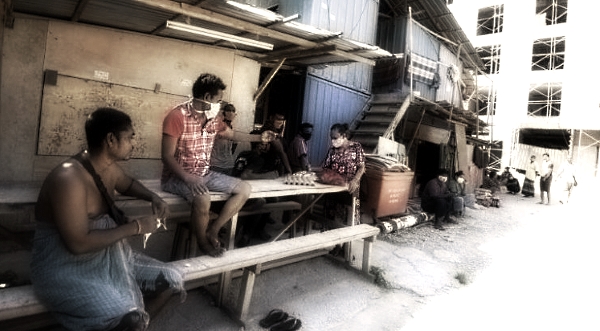Sin Chew Daily
The health ministry has confirmed that the coronavirus is being spread among the foreign workers here, and as such it is utterly necessary to step up the screening of foreign workers.
Economic sectors which require large numbers of migrant workers such as security, manufacturing and construction, need to more strictly adhere to the SOPs in a bid to break the infection chain.
Actually it was already proposed several months ago to carry out compulsory COVID-19 screening for all migrant workers as the authorities found new infection clusters at construction sites. At the same time, new clusters emerged among the migrant workers in neighboring Singapore, causing a spike in the number of new cases there.
As a preventive measure, the national security council is mulling similar measure to regularly screen all migrant workers here in Malaysia in order to effectively break the infection chain.
Singapore has now successfully put the pandemic situation on the island largely under control by containing the virus within migrant worker hostels.
One of the reasons we have been unable to implement mandatory screening of foreign workers since May is because many employers have been unwilling to bear the cost of the tests. Malaysian Employers Federation (MEF) then said employers would have to bear additional RM1 billion of screening cost for their foreign workers.
By right these employers should have discussed with the authorities in order to effectively contain the virus instead of squarely opposing to the government's plan.
While mandatory screening of foreign workers may increase the financial burden of employers, the measure will significantly enhance the safety of areas with high concentration of foreign workers. They may incur heavier losses later on if the virus spreads in the community and they are forced to stop work.
The solution currently being explored is for SOCSO to bear part of the cost and the employers the rest of it.
The national security council should try to reach a consensus with the health, human resources and works ministries as well as SOCSO and employers in relevant sectors as soon as possible in order to expedite the implementation of mandatory screening of foreign workers.
The question is, as many as 700,000 foreign workers here are not SOCSO members. Prior to this, construction sector employers and contractors' organizations said screening of foreign workers would not have a major impact on the sector and they were willing to bear the cost. But a bigger problem is manpower shortage. This means that many employers are actually willing to bear the cost of screening.
What complicates the matter is that there are approximately four million illegal migrant workers in the country, and it is an uphill task for the authorities to carry out screening tests on all of them.
The authorities do not have their particulars and tracking them down is extremely difficult. These foreigners may resort to all available illegal channels to hide from the authorities, besides the fact most of them have very low hygiene awareness and are living in places with poor hygienic conditions, making them easy targets of the virus.
Perhaps the authorities should adopt a a more humane approach in enticing these people to come forward for the screening, with the help from relevant embassies and high commissions.
After screening, the authorities could consider systematically legalizing these foreigners so that more are willing to cooperate. Legalizing the illegal foreign workers will render them much easier to control.
The authorities may also need to take into consideration the capacity of various laboratories, and how much time is required to get the results of mass screening. Where this is concerned, perhaps we can take cue from what Germany has done, by screening ten people in a group in order to reduce the cost and improve efficiency.
This is the best opportunity to test the efficiency of the health authorities in drawing up the country's preventive mechanism as well as ability to respond to an emergency.
The government cannot afford to be indecisive over such a crucial matter pertaining to public hygiene and the health of Malaysians. If we do not act fast, we may have to suffer severe consequences to our economy as well as the well-being of the people.

ADVERTISEMENT
ADVERTISEMENT


































